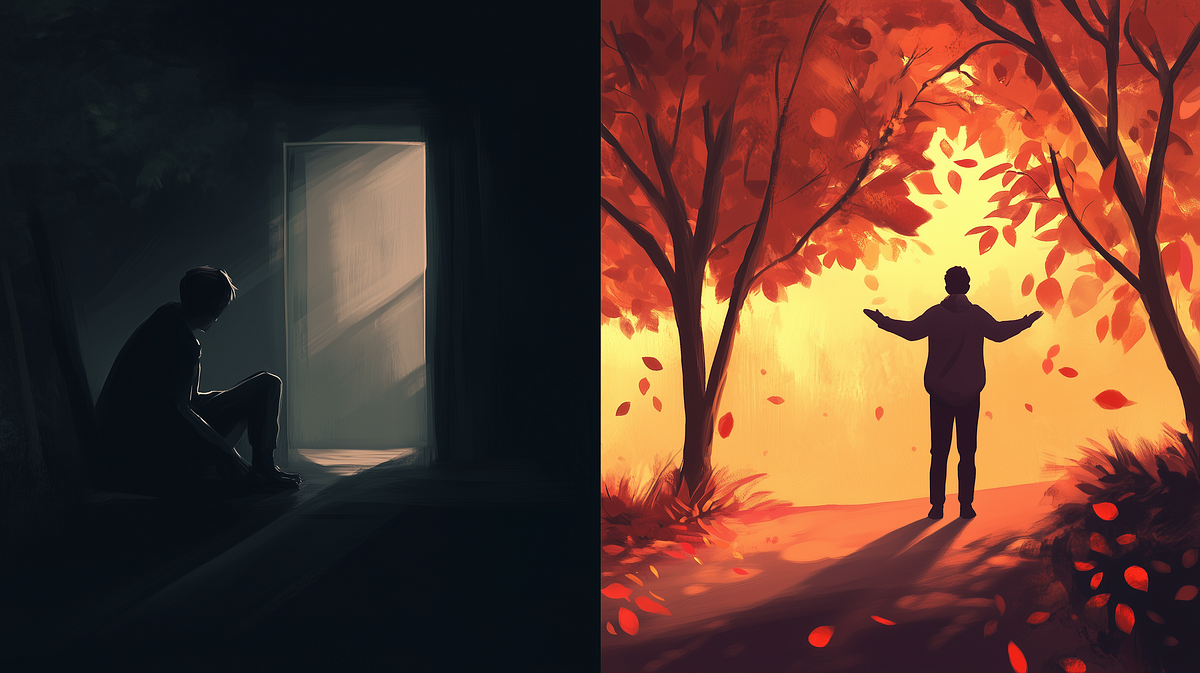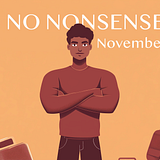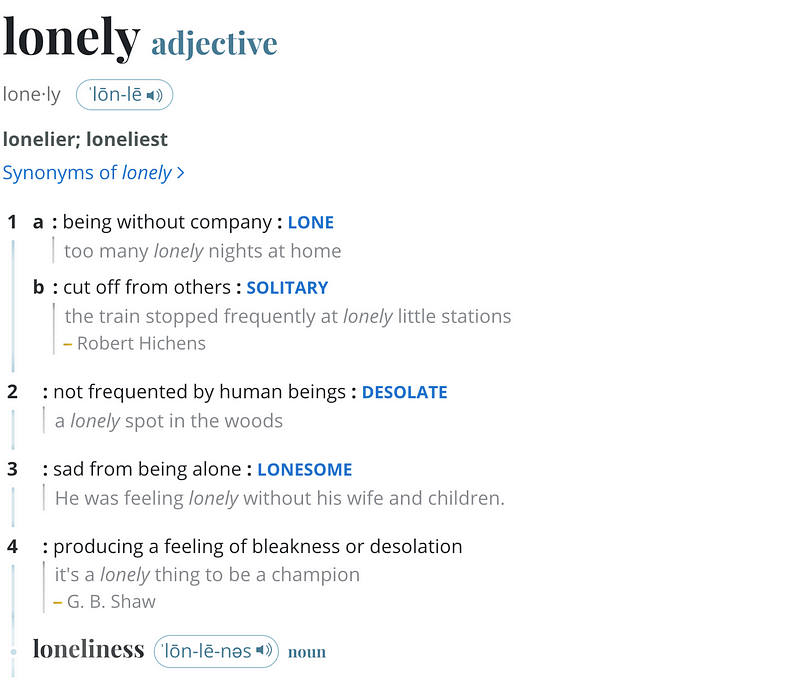The Fear of Being Alone: How Society Confuses Solitude with Loneliness
Loneliness and solitude aren’t the same. Discover how embracing time alone can lead to self-discovery, clarity, and authentic growth.

The Fear of Being Alone: How Society Confuses Solitude with Loneliness | No Nonsense November (18/26)
We live in a world driven by the idea that solitude is the driving factor behind loneliness. The fear of being alone has hit an all-time high, driving people to seek constant connection at the expense of their own mental well-being. But what if avoiding being alone is exactly what’s keeping us from discovering who we truly are? There’s a blurry space between being alone and loneliness, and in that space, like the truth: solitude isn’t the enemy; it’s the only way to truly discover yourself.
No Nonsense November is a month-long challenge dedicated to stripping away distractions and getting to the heart of what matters. Each day, a new article dives into raw, impactful truths designed to inspire, challenge, and provoke thought. The focus is on authenticity — no fluff, no filler, just practical insights that help us better understand ourselves and the world around us.
Through this challenge, we explore themes like growth, resilience, and the nuances of human experience, creating a space to reflect, learn, and act with intention. It’s not just about reading — it’s about thinking deeply, sparking conversations, and taking meaningful steps forward. If you’d like to learn more about what No Nonsense November is all about, check out the full introduction here:

Introduction:
What does it mean to be alone?
In today's day and age, it seems like the ultimate curse: those who are alone are the outcasts, rejected by the rest and forced into solitude as they are accepted by the masses. They are damned to spend the rest of their lives without a sense of belonging. They don’t have a pack, and they lack a community that they can call their own.
The thing is, being alone and being lonely are two different things, and that’s what I am to debunk in this article. See, the thing is, maybe it’s as simple as the words being so similar that we often draw the comparison, or maybe there is indeed some truth to it. The reality is being alone is the single most powerful tool when it comes down to discovering oneself. Yet, by societal standards, it is something that is wrong, and many people fear it. This reasoning has introduced an epidemic of avoidance of self and resulted in extremely high levels of escapism.
Part I: What is Loneliness vs. Being Alone?
See, loneliness has a level of symbolism that suggests that it’s almost a disease of sorts, something that we are plagued with involuntarily, something so harmful that it sounds like it's the worst thing that can happen to you. In that depiction it makes sense that people that spend time alone tend to assume that being alone is the same thing, I mean it makes sense if phrased like that. But the thing is with being alone, is that it’s different and has nothing to do with that sense of loneliness, being alone is more intentional and not so much something that was forced upon you rather can be seen as an intentional choice. But let’s break them down for the sake of clarity:
Loneliness:

Loneliness, as defined in the dictionary, isn’t just being alone. It’s the sensation of not feeling right when alone. It isn’t directly correlated but rather the byproduct of not feeling right when you are alone. They can both coexist, but that doesn't mean one explicitly defines the other. In other words, loneliness may tie into a worse feeling when things just don’t feel right when you are alone, but that sensation is the problem in and of itself.
Alone:

Alone, as you can see from the definition above, on the other hand, almost has a direct correlation to self and, in many ways, can be perceived as the act of doing things by yourself. It’s framed as a more deliberate, concise choice to some extent. It’s a claim rather than something that is imposed upon you.
Comparing the two
When we compare the two, it’s easy to see how it can get confusing and how we can start to compare the two because, once again, it’s almost as if loneliness is the result of an unintentional choice of being alone. Think of it as being in a crowd and having no friends around to interact with; in that situation, you might feel a sense of loneliness. On the other hand, if you made the choice to go alone, that feeling can’t really hold much merit as it was a deliberate choice to do so. It’s safe to say that loneliness starts to take its form only when being alone doesn’t feel right.
Part II: Why We Confuse the Two
Even with a clear definition, it’s not hard to see why the two seem almost interchangeable in a day and age where we have an abundant amount of things such as social media, events, or social gatherings. The sensation of loneliness tends to seem more prevenlant.
There’s this sensation called “The Fear of Missing Out,” or FOMO. Social media is really good at making us feel like everyone is constantly connected and hanging out, and we are just sitting at home uninvited. Everyone appears to be having fun without us. It looks like most people have a bunch of friends and are constantly gathering and hanging out with one another so often that you begin to question why you aren’t doing the same.
The truth about this depiction is that it isn’t based in reality; the truth is the reason people broadcast this to the rest of the world to illustrate exactly that: they are trying to prove to the rest of the world that they don’t spend time alone. Think about it: if you did something regularly, do you think it would warrant being uploaded to social media to flaunt and show off to others? Social media thrives off of showing a small part of a person's life, oftentimes just the highs, very rarely the lows. These highlights present themselves in the form of it being done regularly if someone is constantly uploading them being out or attending events or parties. It’s far more likely that it’s something that they don’t do often rather than something they engage in regularly. By uploading it for others to see, they are almost trying to skew the perspective of others; while, of course, it may be done unintentionally, they almost do it to prove to you that they are rarely alone.
Now, if you follow someone who is constantly almost weekly for long durations of time uploading them being out, seemingly never having time alone, well, that starts to trigger a different thought that’s almost counterintuitive to the initial idea that was making you feel bad, yet it barely sits in your head. Does this person ever spend time alone? It’s weird, isn't it? It starts to reveal that the person likely is avoiding something or maybe even afraid of being alone. That is something far more noteworthy but tends to be far more overlooked.
Bad Times that Were Spent Alone
Aside from the fact that we are constantly being reminded seemingly that we have too much time alone and that it doesn't sit well with us. There is also the fact that past times alone didn’t help us when it comes to feeling great about being alone. It's likely many of us have suffered so much from what we thought was a direct result of being alone, and those times when things felt the worst, we correlated it with that sensation of being alone. Instead, I think it’s because loneliness started to manifest, not just because we were once again by ourselves.
Rejection, heartbreak, cutting off ties with someone we thought was our friend, all of these instances where we once again left to do things independently. Caused us to resent the forced loneliness that we face after. Our brains naturally assumed that those times when it felt like we had nobody by our side, resulting in us being alone, are the sensations that we need to avoid in order to never feel as bad as we did. It’s important to acknowledge that correlation doesn’t equal causation. Just because we were forced to feel loneliness, it doesn't mean it’s because we were alone. It’s instead that feeling that made that time even more difficult than it had to be, and we naturally associated the two in our heads.
The aftermath of those times starts to establish itself in vices that help us to avoid having to go through those hardships again. We start to spend more time looking for more outings and parties to attend; we begin to seek more relationships and distract ourselves in environments where we aren’t alone, such as work or other distractions, to keep ourselves busy just so we don’t feel alone. But running away from ourselves isn’t what helps this feeling it makes it worse, and all of this is due to the fact that running from ourselves feels like the best way to avoid loneliness.
Part III: The Power of Solitude
It goes without saying that the only way to come to terms with this difficult feeling is not to run away from it but rather to embrace it. The time we spend running away tends to make things worse, we think that our actions of avoidance are what things feel better. It’s normal to think that the time spent with others helps or that time away from ourselves will aid in feeling better. I think it’s actually doing more harm.
It’s ironic to think, but the reason you actually got better in most cases is because you did it by yourself. You didn’t have the person that you severed the connection with guide you through this. In fact, you might’ve not had anyone at all to turn to, yet you still figured out some sort of a solution, albeit maybe it was the wrong one. But you still got yourself together, brushed yourself out, and put yourself out there again. Seemingly unaffected by the complex events that took place. That didn’t just happen by chance; that was your doing; your internal willpower got you together and told you you deserve better; enough of feeling sorry for yourself and feeling bad. I will get up and force myself to be better by going out there again and proving to myself that I deserve better. That right there has nothing to do with anyone else. Sure, maybe someone reminded you of it, but your ability to act upon it and listen is all you're doing.
Doesn’t that prove so much? Without even trying your body, you yourself kicked into and started making decisions on your behalf and you never even realized it. It just goes to show that relying on yourself isn’t the problem its the solution.
I think if people spent more time sitting with their emotions rather than trying to mend them right away, things would start to get a lot better for them. More time spent alone can result in many benefits. We start to learn so much that can help us improve in the long run, such as:
- Increasing your self-awareness: The time you spend alone allows you to fully process what actually happened and implores you to discover how things happened the way that they did. You start to gain a better understanding of why things went bad or good and why they happened the way that they did. You might start to see the holes in your narrative; maybe you can recognize that it wasn’t entirely the other person's fault, that there was something you could’ve done differently to change the outcome. Or, at the very least, learn these things about yourself so you don’t have such an adverse reaction next time. You start to develop an instruction manual of yourself to some degree, with guides on what to do for the future, but also ways to troubleshoot problems should they occur again.
- You start to develop new skills: The more time you spend alone, the more it presents itself in the form of new qualities and traits you could’ve never explored as you were too busy running away from being alone. The time you devote to other things starts to present itself in the form of new skills you might’ve never had the time to appreciate or even discover as you were so preoccupied running away from it. You might discover that your problem-solving abilities are far greater than you believed or that your innate creativity around dilemmas you face in your life is powerful and, if honed in properly, can start to be beneficial in other aspects of your life. All of these good things can start to show themselves on the back of being alone and giving yourself the time to explore them without the pressure or constraints of time working against you.
- Reconnecting with personal values and goals: There is no denying that all this new time you spend alone can pay dividends in getting your mindset and life back in order. It helps you reenvision your priorities once more, and it generates a newfound passion and motivation that reignites your motivation to chase after life or the goals you really want to accomplish. You’ll start to recognize that these distractions were alone, deviating you from the person you want to be and not helping you recover so you can get back on track.
All of these amazing things start to happen to you with little effort; they are all just residual benefits from giving them the time and energy to thrive and grow. In reality, they only stood a chance because you stopped focusing on avoiding being with yourself, but rather, you prioritized it; in reality, taking the time away from the outside world to focus on your inside world is such a powerful concept. It's hard to deny that the only person that's well-equipped enough to confidently solve your problems is you. Nobody else can. I am incredibly passionate about this process, so much so that in a previous entry of No Nonsense November, I wrote a whole article dedicated to what it means to explore your time alone; if you want to read the full article, check it out below:

Being alone will never be easy, especially after so many years of avoiding it. It will be difficult at first; there is no denying that, but if you take the time and exhibit patience, practice, and prove to yourself that you have the emotional resilience to tackle the process. You will guarantee to find yourself presently surprised by the outcome. We weren’t meant to spend every waking moment surrounded by others, nor should we expect the outside world to teach us about ourselves. We are the ones that hold the answers to all of our problems.
Life undeniably can be far more enjoyable with others and loved ones, people we truly appreciate and hold dear, but if we struggle to be ourselves none of these relationships will last. Figuring out who you are is the only way to understand what role they play in your life, and what value you provide in theirs. Without a better sense of self, how can you expect people to understand who you truly are?
Part IV: Overcoming the Fear of Being Alone
Now that we covered how beneficial it can be to spend time alone the next question is where do we start. Much like everything in life it requires balance too much of it and you will start to feel lonely, but too little of it on the other hand and we run into the same dilemma we have been trying to address.
In order to get started, we first need to reframe alone time from being an inherently considered bad thing into a restructured new thing. An easy start would be simply rephrasing it rather than saying I am all alone; think of it as spending the time on me. This method allows us to dismiss it as a negative thing and instantaneously shift it into a blessing or gift that we are giving ourselves, almost like a reward.
Make habits: it's safe to assume that many of us thrive on the back of our habits and ensure we keep a steady pass at progressing towards our goals. Time alone can also fit into there, it might sound strange, the idea is not just to sit and do nothing, it can be paired with other responsibilities of course. But start to condition yourself into thinking that you are doing it with intention, and to make things easier, focus on doing things that bring you pleasure rather than covering your chores or responsibilities. Think of it as a spa day of sorts, where your new me time is spent doing things you couldn’t do had you been busy with other things. Indulge in hobbies, catch up on shows, groom yourself, pamper yourself with a treat. This will unlock something new in your life, and showing yourself that self-love will start to define a standard to which you can adhere to, not only but the additional benefit is you will learn to expect people to care about you, and you will stop comprising when they fall short. The boost in self-love ties in well with me-time.
In the early stages of taking time alone, the most difficult thing will likely be striking a balance. The goal isn’t just to cut everyone off and suffer in total isolation but rather to prioritize and learn how to say no. If you took the last step into consideration, well, maybe you can mix it in here; think about leaving hangouts for certain days of the week or only allowing for hangouts once you’ve had your time alone. Give constantly socializing a lower priority over time spent with yourself to ensure that you are teaching yourself that you should always come first.
Tips if you find it hard to overcome the fear of being alone:
- Just remember the being alone is something you need to force on yourself its a choice. Only pursue it if you think you are lacking alone time; the goal isn’t to force it where it starts to transform into loneliness but just simply recognize that if you spend too much time with others rather than yourself, it's in your best interest to ease off a bit and give yourself that time.
- Overcoming the fear still won’t be all that easy, but rather than not trying at all start at the beginning, why is it that you fear being lonely, what from your past caused you to feel this way? More importantly, is there something you can do to address that feeling? Is it a lack of company or the desire for it? Starting with where it hurts more paves the way to understanding the root of the issue. Once you’ve discovered it, you can build your way up slowly but surely.
- Lastly it’s important to go easy on yourself and start small, infact this is a good step for many reasons, by simply engaging in it you are already practicing. Just thinking about it and being aware of it is, in a sense, time contemplating. There is no set of expectations of how fast you need to delve into spending time alone. It’s a matter of discovering it for yourself. Start by treating yourself or offering small rewards, maybe, and tie it in with something so it doesn't feel overwhelming. In due time once you’ve conditioned yourself to associate it with something good it’s only a matter of time before you start to crave it, it’s almost like magic.
Conclusion: Reclaiming Solitude as a Path to Authenticity
The thought of being alone can be a scary one, and it's one of the most misunderstood emotions that we experience in modern-day life. It isn’t the solitude itself that we fear but the feelings that follow when we sit with ourselves — the feelings that often stem from unresolved pain, unmet needs, or the haunting expectations of societal expectations. In reality, in solitude, we find our greatest strengths and opportunities in self-discovery, compassion, love, and growth.
When we mix the two up, alone being one and the same with loneliness, we rob ourselves of the chance to redefine who we are at our own pace. Solitude, or time spent alone, isn’t the lack of connection but rather the welcoming of it; it opens the door to connect with the one person we most often overlook: ourselves. It is through this solitude that we develop clarity, resilience, and self-respect — qualities that would’ve otherwise remained neglected had we not taken the time to address them and drive ourselves to dedicate more time to them; we start to lead the way to a more fulfilling life not only for ourselves but to foster more meaningful relationships and an overall more meaningful life.
Thank you for taking the time to read today’s article! If this piece resonated with you, sparked new thoughts, or gave you a moment to pause and reflect, I’d love to hear your perspective. Feel free to share your thoughts or connect with me through the links below — let’s keep the conversation alive:
📩 Email: [email protected]
📰 Substack: https://substack.com/@mostlysocials
☕ Ko-fi: https://ko-fi.com/mostlymedia
🐦 Twitter: https://x.com/mostly_media
🌌 Bluesky: https://bsky.app/profile/mostly.media
If you missed yesterday’s article, you can find it here:




